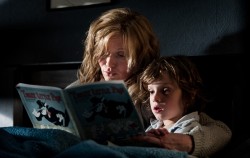Cinema | December 24th, 2014

Earning accolades for its stylish design on a modest budget, its reliance on character and storytelling instead of CGI, and its reverence for several legendary genre hallmarks, Jennifer Kent’s “The Babadook,” like its namesake ghoulie, can be tough to banish from your head. Tracing the downward spiral of a struggling widow who loses her husband in a car wreck on the way to the hospital to deliver their son, Kent grounds her breakthrough film in the horror of the everyday before she unleashes the supernatural frights of the title figure, a bogeyman who first appears in the pages of a mysterious pop-up book.
Amelia (Essie Davis) and the now about-to-be-seven Samuel (Noah Wiseman) manage the best they can, although the odd little boy’s constant disruptions and “disobedience” hint at longstanding behavioral issues, which we suspect stem from the tragic circumstances attending Samuel’s birth. Single parent Amelia, at her wit’s end, sacrifices her own sleep every night, since Samuel complains of regular torment by a monster who visits his bedroom. With her job at stake, Amelia’s stress is palpably conveyed by the sympathetic Davis, and Kent introduces the unsettling idea that mother harbors ill will, maybe even blame, toward her child.
Amelia is less dismissive of Samuel’s claims after she discovers “Mister Babadook,” an authorless tome filled with grisly monochromatic images and prophetic rhymes. Featuring a menacing evildoer reminiscent of Lon Chaney’s repulsive “Man in the Beaver Hat” disguise from the lost “London After Midnight,” the twisted text grows more disturbing with each turn of the page. The creepy red-covered album, designed by Alex Juhasz, is a marvel of illustration and engineering, and “Mister Babadook” steals one of the film’s best scenes, immediately assuming a place alongside some of cinema’s most effective false documents.
Shrewd and ambitious – Kent famously wrote a letter to Lars von Trier that landed her the opportunity to work for the director on “Dogville” – the filmmaker manages to load plenty of potential readings into that dreaded volume and the creature it spawns. From the draining demands of motherhood to the unthinkable rejection of one’s own child to the bottomless grief of a marriage cut short, the Babadook can easily symbolize any number of demons. Kent leaves open the possibility that Amelia constructed the book herself, an idea that should give even the most hardened horror aficionado the shivers.
“The Babadook” is Kent’s inaugural feature following a long time spent as a performer, and given the movie’s confidence and imagination, it is hopefully just the first in a series of projects. Take one look at “Monster,” the 2005 short that forms the basis of the story that would become “The Babadook,” and Kent’s gifts as a visual storyteller are evident. A motif in “The Babadook” is the use of mediated imagery to intensify the jaw-clicking disequilibrium and hallucinations experienced by the exhausted Amelia while she stares at her television. Kent selects tantalizing clips from Rupert Julian’s “The Phantom of the Opera,” Lewis Milestone’s “The Strange Love of Martha Ivers” and Mario Bava’s “Black Sabbath,” along with dazzling magic tricks from several evocative Georges Melies shorts.
One of Kent’s most challenging moves is to dive deep into Amelia’s psychological anguish, switching from a perceived external threat posed by the Babadook to an internal battle operationalized as a kind of possession. Narratively, the shift dampens the immediacy of the Babadook as an intriguing and involving instrument of fear, but parents may find Amelia’s filicidal tendencies every bit as harrowing as similar depictions in films like “Bigger Than Life,” “Eraserhead” and “The Shining.”
“The Babadook” is now available on demand.
February 23rd 2026
February 23rd 2026
February 16th 2026
February 16th 2026
February 9th 2026

__293px-wide.jpg)
_(1)_(1)_(1)_(1)_(1)__293px-wide.jpg)


_(1)_(1)_(1)_(1)_(1)__293px-wide.jpg)